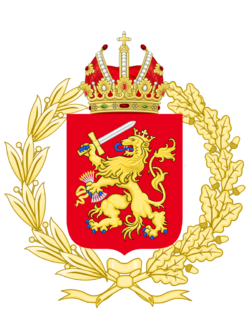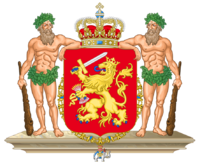Royal Army of Ahrana
| Royal Army of Ahrana | |
|---|---|
 Crest of the Royal Army of Ahrana | |
| Active | 2020 |
| Country | |
| Allegiance | Ahrana |
| Type | Army |
| Role | Land Warfare |
| Headquarters | Gustov Barracks |
| Commanders | |
| Commander-in-Chief | Sigird A. A. V. Florence-Goring of Strasburg & Aleksandra Victoria Anne Mishia Chayka II |
| Chief of Defense | Victoria Sarrov |
| General of the Army | Viktor Stebbins |
| General-Colonel of the Army | Sasha Elisabeth Iona of Mishta |
| Insignia | |
| War Flag |  |
| Civil Ensign | |
| Ceremonial Flag |  |
| Roundel (Aircraft) | |
The Royal Army is the Land-based branch of the Armed Forces of Ahrana, together with the Royal Guards. Since the re-establishment of the Kingdom the Royal Army has undergone some massive changes in structure, equipment, and training. The Army is adherent to the Statutes of Peace & War and is under the authority of the Defense Council under the Chief of Defense who is member of the Defense Council.
History
The Royal Army takes its history from the original Royal Army founded under the Mishia Dynasty during the First Unification Wars and the First Kingdom, together with the Royal Guards the History goes back over 900 years to the First Standing Ahranaian Army. The Royal Army has not seen any Battles or Wars since its reintroduction as the sole Land Warfare branch, but nonetheless has taken over the role from the predecessor the Peoples' Army of the Federation.
The Royal Guards Regiment is over 1000 years old and was founded by the Kingdom of Ahran to protect the King and to be the King's own personal army and guards, today that has change drastically with only Three Royal Regimental Guard Units active. The Royal Guards are still responsible for the protection of the Monarchy and the Imperial Family as well as the Royal Residences
Structure
The current structure of the Royal Army has changed to having two commands, one called the Regular Army and the other called the Royal Regimental Guards, each making the Royal Army a functioning branch of the Armed Forces. The Regular Army is further divided into three divisions that have Brigades, currently the brigade system is being reintroduced to the Armed Forces.
The Royal Regimental Guards have Three Regiments that make up the Royal Guards, 1st Regimental Guards, 2nd Regimental Guards and the Life Guards Regiment. The Royal Regimental Guards are the smallest of the Army, but holds the most specialization of all the Armed Forces.
Equipment
Uniforms
The Regular Army has two sets of Uniforms the Dress Blues and then the Casual Dress, the Dress Blues are worn on formal occasions such as State Functions, Funerals, Inspection by the Monarchs or the General of the Army. The Regular Army Casual dress is the Army Standard Camo Uniform with the Army Cover or Beret, to which no medals or ribbons are worn. The Royal Regimental Guards have different uniforms from the regular army. The First and Second Regimental Guards have Ceremonial Dress and Casual Dress. The Ceremonial Dress is worn the most often. When the Regiments are on Duty protecting the Monarchs or the Imperial Family, they wear: a Black tunic with the White belts that cross in the front and back, a Utility pouch with the Royal Coat of Arms on the badge, blue trousers with a white stripe, black military dress shoes, with a black bearskin hat with the Royal Coat of Arms as the crest. The Casual dress for the First and Second Regimental Guards is the standard Camo Uniform with the Regimental beret that is red with all medals displayed unless in a battlefield. The Life Guards Regiment has two different sets of Ceremonial Dress and Casual Dress. The Ceremonial Dress for the Life Guards.





























